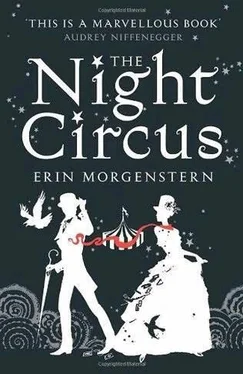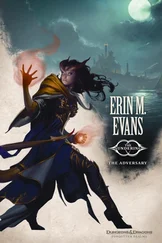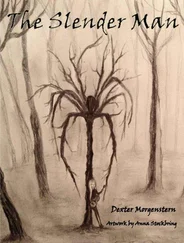The distance of the circus feels more pronounced despite the tenuous contact through paper and ink.
And there is so little about her . Isobel does not even inscribe her name upon the pages, referring to her in passing only as the illusionist, a precaution he advised himself and now regrets.
He wants to know everything about her.
How she spends her time when not performing.
How she interacts with her audiences.
How she takes her tea.
He cannot bring himself to ask Isobel these things.
When he writes her in return, he requests that she continue to write as often as possible. He emphasizes how much her letters mean to him.
He takes the pages inscribed with her handwriting, descriptions of striped tents and star-speckled skies, and folds them into birds, letting them fly around the empty flat.
***
IT IS SO RARE to have a new tent appear that Celia considers canceling her performances entirely in order to spend the evening investigating it.
Instead she waits, executing her standard number of shows, finishing the last a few hours before dawn. Only then does she navigate her way through nearly empty pathways to find the latest addition to the circus.
The sign proclaims something called the Ice Garden, and Celia smiles at the addendum below which contains an apology for any thermal inconvenience.
Despite the name, she is not prepared for what awaits her inside the tent.
It is exactly what the sign described. But it is so much more than that.
There are no stripes visible on the walls, everything is sparkling and white. She cannot tell how far it stretches, the size of the tent obscured by cascading willows and twisting vines.
The air itself is magical. Crisp and sweet in her lungs as she breathes, sending a shiver down to her toes that is caused by more than the forewarned drop in temperature.
There are no patrons in the tent as she explores, circling alone around trellises covered in pale roses and a softly bubbling, elaborately carved fountain.
And everything, save for occasional lengths of white silk ribbon strung like garlands, is made of ice.
Curious, Celia picks a frosted peony from its branch, the stem breaking easily.
But the layered petals shatter, falling from her fingers to the ground, disappearing in the blades of ivory grass below.
When she looks back at the branch, an identical bloom has already appeared.
Celia cannot imagine how much power and skill it would take not only to construct such a thing but to maintain it as well.
And she longs to know how her opponent came up with the idea. Aware that each perfectly structured topiary, every detail down to the stones that line the paths like pearls, must have been planned.
It would be so taxing to manage something similar, she feels fatigued even considering it. She almost wishes her father were there, as she is beginning to understand why he had always been so adamant about building up her strength and control.
Though she is not entirely certain she wants to thank him for it.
And she likes having the space to herself, the stillness and the calm sweetened with the subdued scent of frozen flowers.
Celia remains in the Ice Garden long after the sun rises outside, and the gates have been closed for the day.
***
THE CIRCUS ARRIVES NEAR LONDON for the first visit in some time, and the afternoon before it opens there is a knock on the door of Marco’s flat.
He opens the door only partway, holding it in place when he finds Isobel in the hallway.
“You changed your locks,” she says.
“Why did you not tell me you were coming?” Marco asks.
“I thought you might like the surprise,” Isobel says.
Marco refuses to let her enter the flat, but he leaves her waiting in the hall for only moments before returning, bowler hat in hand.
The afternoon is crisp but bright and he takes her to tea.
“What is that?” Marco asks, glancing down at Isobel’s wrist as they walk.
“Nothing,” she says, pulling the cuff of her sleeve down to obscure his view of the bracelet, a carefully woven braid of her hair entwined with his.
He does not inquire further.
Though Isobel never takes the bracelet off, it is gone when she returns to the circus that evening. Vanished from her skin as though it had never been there.
Tasting: LYON, SEPTEMBER 1889
Herr Friedrick Thiessen is on holiday in France. He often goes on holiday in France in the autumn, as he is a great lover of wine. He picks a region and roams the countryside for a week or perhaps two, visiting vineyards and collecting bottles of pleasing vintage to be shipped back to Munich.
Herr Thiessen is friendly with several French winemakers and has made clocks for many of them. He visits one such winemaker on this particular trip, to pay his respects and sample the latest bottles. Over a glass of burgundy, the winemaker suggests that Friedrick might enjoy the circus that is in town, set up in a field a few miles away. A rather unusual circus, only open at night.
But it is the clock, the elaborate black-and-white clock situated just inside the gates, that the winemaker thinks might particularly interest Herr Thiessen.
“Reminds me of your work,” the winemaker says, gesturing with his glass to the clock on the wall above the bar, shaped like a cascading bunch of grapes that tumble into a wine bottle that fills with wine as the hands on its label (an exact replica of the vineyard’s label) tick by the seconds.
Herr Thiessen is intrigued, and after an early dinner, he puts on his hat and gloves and begins walking in the general direction his winemaker friend had indicated. It is not difficult to locate his destination, as several townspeople are walking in the same direction, and once they pass out of town and into the fields, the circus cannot be missed.
It glows. That is Herr Friedrick Thiessen’s first impression of Le Cirque des Rêves, seen from half a mile away and before he even knows its name. He walks toward it on this chilly evening through the French countryside like a moth to a flame.
There is a considerable crowd outside when Herr Thiessen finally reaches the gates, and despite the crowd, he would have spotted his clock instantly, even without having been informed of its placement. It looms across from the ticket booth, just inside the large iron gates. It is about to strike seven o’clock, and he stands back to watch it, letting the line for tickets pass in front of him as the harlequin juggler pulls out a seventh ball from thin air, as the dragon’s tail twitches and the clock chimes seven quiet chimes, barely audible over the din of the circus.
Herr Thiessen is pleased. The clock appears to be in perfect working order and has obviously been well taken care of, despite being left out in the elements. He wonders if it might need a stronger varnish, and wishes he had been informed that it would be used out of doors when he was constructing it, though it looks none the worse for wear. He keeps his eyes on it as he waits in line, wondering if he should try to contact Mr. Barris about the matter, if he still has the London address in his files back in Munich.
When it is his turn, he gives the posted amount of francs to the ticket seller, a young woman in a black dress and long white gloves, looking more prepared for an elegant evening at the opera than for a night selling tickets at a circus. As she pulls out a ticket he inquires, first in French and then in English when she does not catch his meaning, if she might know whom he could contact about the clock. She does not reply but her eyes light up when he identifies himself as the person responsible for its construction. She returns his francs with his ticket despite his protestations, and after rummaging through a small box, she produces a business card which she hands him as well.
Читать дальше












